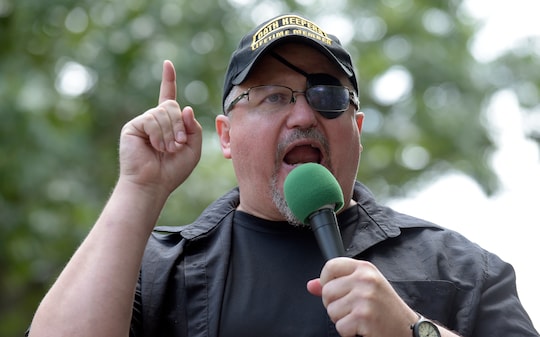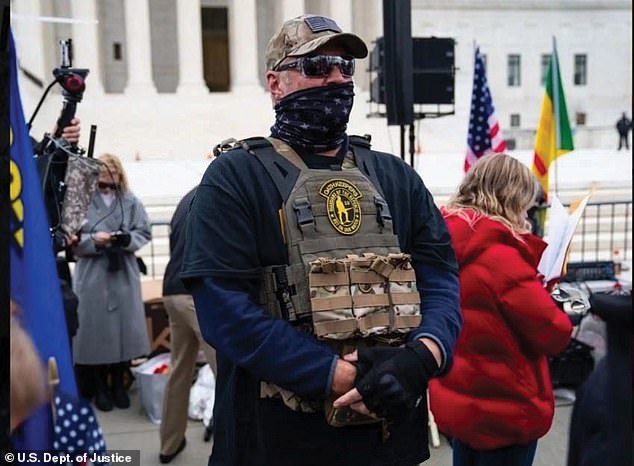
Stewart Rhodes, founder of the extremist group known as the Oath Keepers speaks during a rally outside the White House in Washington, D.C., in 2017.: Susan Walsh/AP
By Glynn Wilson –
WASHINGTON, D.C. — Finally after a trial that lasted more than two months and three days of jury deliberations, a guilty verdict was returned against Stewart Rhodes and Kelly Meggs of the right-wing militia group the Oath Keepers on Tuesday for leading a seditious conspiracy to keep former President Donald Trump in power and prevent the inauguration of President Joe Biden, who won the election with 306 electoral votes to 232 for Trump, the loser.
It was indeed a conspiracy to oppose the lawful transition of presidential power by force, according to the jury, as the U.S. Department of Justice argued in the most high profile prosecution to date resulting from the violent attack on the Capitol on Jan. 6, 2021.
All four co-defendants were also convicted of obstructing Congress as it met to confirm the results of the 2020 election, offenses also punishable by up to 20 years in federal prison.
Two remaining seditious conspiracy trials are set to begin in December against five other Oath Keepers and leaders of the Proud Boys, including the chairman Henry ‘Enrique’ Tarrio, highly visible leaders of the alt-right or far-right anti-government militia movements. Both groups were featured in Congressional hearings this summer by the House Select Committee investigating the Jan. 6 insurrection and attack.
Rhodes and his co-defendants based their defense on claims that there was no plan to enter the Capitol that day, and claimed their participation was based on an assumption that Trump himself would join their plan for a “civil war” by citing the Insurrection Act to call up the militia to prevent Biden from taking power.
Rhodes and his cohorts blended in with other Trump supporters responding to the president’s call to march on the Capitol all dressed in combat gear, created a military-style stack formation to break through the lines of Capitol Police guarding the building and members of Congress inside, and converged on the Capitol after staging an “arsenal” of weapons in hotel rooms across the Potomac River in Virginia.
Prosecutors presented texts and video as evidence and said their words and actions demonstrated tacit agreement with an illegal plot proposed by Rhodes repeatedly in public and private statements for weeks leading up to Jan. 6, warning that “bloody civil war” was necessary to keep Trump in office if the “unconstitutional” election results were not somehow overturned.
Rhodes’s trial concluded as the former president announced his renewed candidacy for the White House in 2024 after midterm elections in which his party failed to match historical gains in Congress and voters resoundingly rejected his endorsed candidates and 2020 election deniers.
Closing arguments began the day Attorney General Merrick Garland named special counsel Jack Smith to take over the ongoing investigation into efforts to interfere with the lawful transfer of power following the 2020 presidential election.
The verdict is the latest in Trump’s falling political fortunes.
Kenneth Harrelson, 42, a medically discharged former Army sergeant and father of two from Titusville, Fla., who prosecutors called the “ground team lead”, was found not guilty of seditious conspiracy but guilty of conspiracy to obstruct Congress, along with Jessica Watkins, 39, another Army veteran and bar owner and militia organizer from Woodstock, Ohio, as well as Thomas Caldwell, 68, a retired Navy intelligence officer from Berryville, Va. Harrelson and Watkins did enter the Capitol that day, while Rhodes remained outside and in communications with those inside, and were both also charged and convicted of damaging property. Harrelson was also charged with destroying evidence, while Watkins faced a separate rioting charge.
The jury found Meggs and Watkins guilty of conspiring to obstruct Congress, while all five were convicted of obstructing Congress in certifying the electoral votes confirming Biden the winner in the presidential election. Meggs, Harrelson and Watkins were also convicted of conspiring to impede lawmakers, but not property destruction, while each defendant was found guilty of rioting and destruction of evidence.
In closing arguments, Kathryn L. Rakoczy, one of the assistant U.S. attorneys prosecuting the case, showed jurors a Dec. 10 text message by Rhodes to Oath Keepers attorney Kellye SoRelle, Rhodes’s girlfriend and his post-election liaison to groups working to flip the results, including Trump’s campaign and the legal team of Rudy Giuliani. Rhodes told SoRelle that if Trump did not act, “we will have to rise up in insurrection.”
U.S. Attorney Jeffrey S. Nestler, one of the lead prosecutors in the case, told the jury in his opening argument that in the weeks after Biden won the election, Rhodes and his subordinates “concocted a plan for an armed rebellion to shatter a bedrock of American democracy” — the peaceful transfer of presidential power.
Nestler also closed the government’s case last week, declaring that the Oath Keepers had plotted against President-elect Biden, ignoring both the law and the will of the voters, because they hated the results of the election.
“They claimed to be saving the Republic,” he said, “but they fractured it instead.”
According to evidence and testimony, on Christmas Day in 2020, Rhodes told Florida co-defendants he doubted Congress would keep Trump in the White House on Jan. 6, but that they would try anyway.
“The only chance we/he has is if we scare the s— out of them and convince them it will be torches and pitchforks time,” Rhodes wrote. “And he [Trump] needs to know that if he fails to act, then we will.”
In a recordings played for jurors, Rhodes said, if Trump was “just gonna let himself be removed illegally, then we should have brought rifles. We could have fixed it right then and there. I’d hang f—-ing Pelosi from the lamppost,” he said, referring to House Speaker Nancy Pelosi of California.
Seditious conspiracy is the most serious charge brought so far in any of the 900 criminal cases coming out of the massive investigation of the Capitol attack, an inquiry that could still result in hundreds of additional arrests. About 450 defendants who participated in the rioting that day, roughly half of those charged so far, pleaded guilty.
Seditious conspiracy is a charge that goes back to efforts to protect the federal government against Southern Confederate rebels during the Civil War. It has been used against far-right militia groups, members of radical trade unions and Puerto Rican nationalists. The last successful sedition prosecution was in 1995 when a group of Islamic militants was found guilty of plotting to bomb New York City landmarks.
Messages introduced at trial showed that Rhodes and his co-conspirators seemed obsessed with the leftist movement known as Antifa, which he believed was in league with Biden’s campaign. At one point during the trial, Rhodes, who took the stand in his own defense, told the jury he was convinced that Antifa activists would storm the White House, overpower the Secret Service and forcibly drag Trump from the building if he failed to admit his defeat.
But evidence reported exclusively by the New American Journal shows that both Black Lives Matter activists and Antifa anti-Nazi activists — who had clashed with the Oath Keepers and Proud Boys in previous protests — made a conscious decision to “stand down” on Jan. 6, based on advance knowledge of what was being planned that day, plans that involved blaming them for violence. During the week of Jan. 6, I interviewed members of Antifa who were more than 1,000 miles away in a Florida campground. This has never been reported anywhere else.
At trial, prosecutors demonstrated how Rhodes, a former Army paratrooper with a law degree from Yale, became increasingly panicked as the election moved toward its final certification at a joint session of Congress on Jan. 6. Under his direction, the Oath Keepers — whose members are largely former law-enforcement officers and military veterans — took part in two “Stop the Steal” rallies in Washington, providing event security and serving as bodyguards for pro-Trump dignitaries.
Rhodes was desperate to get in touch with Trump and persuade him to take extraordinary measures to remain in power. He posted two open letters to Trump on his website in December, begging the president to seize data from voting machines across the country that would purportedly prove the election had been rigged.
Rhodes urged Trump to invoke the Insurrection Act, an old law that could give the president the power to call up militias to suppress the “coup” led by Biden and Kamala Harris, the incoming vice president.
“If you fail to act while you are still in office,” Rhodes told Trump, “we the people will have to fight a bloody war against these two illegitimate Chinese puppets.”
As part of the plot, Rhodes placed a “quick reaction force” of heavily armed Oath Keepers at a Comfort Inn in Arlington County, Va., ready to rush their weapons into Washington if their compatriots at the Capitol needed them. Caldwell, a former Navy officer, tried at one point to secure a boat to ferry the guns across the Potomac, concerned that streets in the city might be blocked.
Rhodes tried to persuade the jury during his testimony that he had not been involved in setting up the “quick reaction force.” But he also argued that if Trump had invoked the Insurrection Act, it would have given the Oath Keepers the legal standing as a militia to use force of arms to support the sitting president.
___
Thanks to on-the-ground reporting from The New York Times and The Washington Post for this deadline report.
The U.S. Department of Justice issued a press release in the case on Wednesday.
___
If you support truth in reporting with no paywall, and fearless writing with no popup ads or sponsored content, consider making a contribution today with GoFundMe or Patreon or PayPal.














